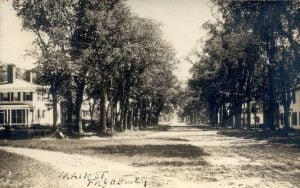Fryeburg Village Fire Companies ~ Fires
This corporation was chartered March 1, 1887, for the purpose of organizing for protection from fire. On the last day of the month an organizing meeting was held at which John C. Gerry was chosen clerk; Thos. C. Shirley, treasurer; Asa 0. Pike, Wm. Gordon and John Weston, assessors; and A. R. Jenness, F. L. Mark and Seth W. Fife, fire wardens. This action followed the burning of the original and celebrated Oxford House which occurred Feb. 14, preceding. The earliest DESTRUCTIVE FIRE of note was in 1 843, Sept. 15, when “Eastman’s Coffee House,” with two stores and two … Read more


